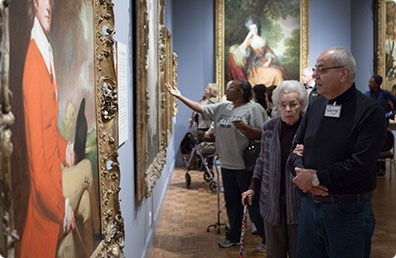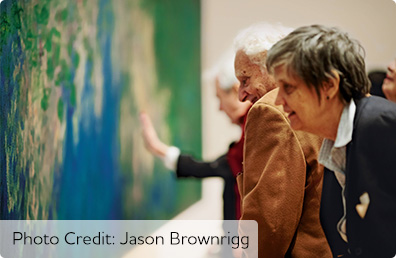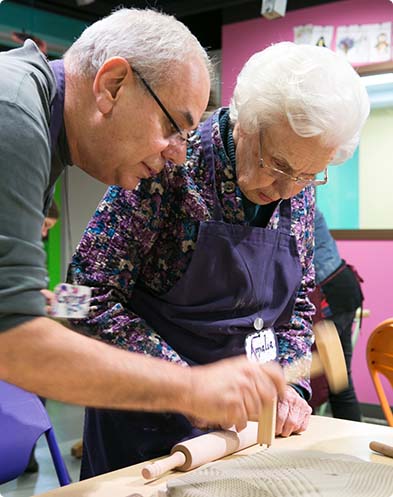
Double Your Impact for the Holidays
Double Your Impact for the Holidays
Your urgently needed year-end gift can go twice as far to provide care and support and accelerate Alzheimer's research this holiday season — and all year long. Show your giving spirit today during this 2x Match Challenge.
Donate NowMuseum programs inspire those facing Alzheimer's
 Walking the majestic halls of the Detroit Institute of Arts (DIA), George and Amalia Guzzio were able to step out of their roles as caregiver and person living with dementia, and return for a few hours to mother and son. An amateur artist and art lover, Amalia frequently took George and his brother to museums while George was growing up in New York City. Thanks to a specialized DIA program, George was able to return the favor while providing them both a respite from the trials of dementia.
Walking the majestic halls of the Detroit Institute of Arts (DIA), George and Amalia Guzzio were able to step out of their roles as caregiver and person living with dementia, and return for a few hours to mother and son. An amateur artist and art lover, Amalia frequently took George and his brother to museums while George was growing up in New York City. Thanks to a specialized DIA program, George was able to return the favor while providing them both a respite from the trials of dementia.
For years, George and Amalia attended the DIA's Minds on Art, a program offered in partnership with the Alzheimer's Association Greater Michigan Chapter, which features special guided art discussions for people living with dementia, followed by art making in the museum's studio.
"Art opens people up — and I think the program brought out my mother's actual personality," George says. "She could get annoyed with me now that I was her caregiver, and this allowed her to interact with other people. It was a much-needed break in our roles that bonded us, we were equals again there — adult with mother."
Minds on Art, now in its 10th year, is one of over 135 museum programs around the world created with guidance from the New York City Museum of Modern Art's (MoMA's) Alzheimer's Project. The project launched as an internal MoMA program in 2007 as a way to make art accessible to people living with dementia and their caregivers. The program was so successful that MoMA adapted its techniques into free training resources that staff in any type of museum can use to create similar programming.
 The goal of the program is to encourage self-expression for people living with dementia and to strengthen relationships and support for caregivers. Specially trained docents lead curated tours, stopping at paintings or other exhibits and sparking conversation with a technique called VTS — visual thinking strategies.
The goal of the program is to encourage self-expression for people living with dementia and to strengthen relationships and support for caregivers. Specially trained docents lead curated tours, stopping at paintings or other exhibits and sparking conversation with a technique called VTS — visual thinking strategies.
The core of VTS is open-ended inquiry — allowing people to look at and make art in a safe space "with no prescribed outcome or wrong answers," says Byron Nemela, studio programs coordinator at the DIA. The artwork selected for tours typically inspires a story, encouraging personal interpretation so that people can create their own narrative. Participants share their thoughts and feelings, expressing themselves in new ways.
"The visual arts are a perfect tool to use for people with dementia because they don't require memory. We can all look at a work of art together and it levels out the playing field," says Francesca Rosenberg, director of Community, Access and School Programs at MoMA. "We open up conversation about the work of art with the goal of making connections between the work and each individual's history, their lived experience and the person they came with."
The program is equally beneficial for caregivers. A research study on The Alzheimer's Project found that the program made caregivers feel more socially supported. Caregivers are able to connect with others facing similar challenges, Rosenberg says, and interact with the person they are caring for through a safe and fun activity.
 At Minds on Art, people view three pieces of art in the gallery, then spend one-and-a-half hours in an art studio creating easy-to-make pieces like pottery or watercolor paintings. Christine Mark, the DIA's manager of Volunteer Development, says Minds on Art has often helped people living with dementia talk about older memories they haven't discussed in years or their caregivers have never heard before.
At Minds on Art, people view three pieces of art in the gallery, then spend one-and-a-half hours in an art studio creating easy-to-make pieces like pottery or watercolor paintings. Christine Mark, the DIA's manager of Volunteer Development, says Minds on Art has often helped people living with dementia talk about older memories they haven't discussed in years or their caregivers have never heard before.
"The process allows for connections in a way that people with memory loss don't often get, because they can be isolated, and people often discount their memories and ability to interact," Mark says.
For many, the program offers a chance to experience something new — which can be in short supply for both caregivers and those with dementia. Amalia loved having a reason to get dressed up and go out, George says, and appreciated the attention she received from docents who treated her like an adult.
Art and music can enrich lives
Art and music allow for self-expression and engagement for people living with Alzheimer's or another dementia, even after the disease has progressed.
"There is this thought that for people living with dementia, their lives are closing down, but instead I feel programs like these open up possibilities for them and can add a whole new dimension to their later life," Rosenberg says.
Amalia died in 2017, and George says their time spent at Minds on Art made up some of their last good moments. He encourages other caregivers and people living with dementia to attend similar programs. George cherishes the art he made with his mom, and still displays it in his house.
"You rub your hand over the pieces she made and you kind of feel her hand," George says. "It was incredibly special to do this with her."

The first survivor of Alzheimer's is out there, but we won't get there without you.
Donate Now
Learn how Alzheimer’s disease affects the brain.
Take the Brain Tour
